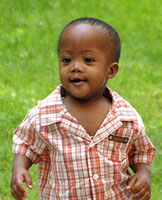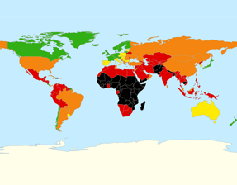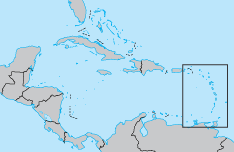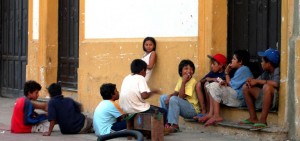Children of Grenada
Realizing Children’s Rights in Grenada
Grenada is a Caribbean island, whose GDP per person is $14,000. Children make up a significant portion of the population; twenty-five percent of Grenadan inhabitants are between 0 and 14 years old. On average, each woman has a little over two children.
This country signed the Convention on the Rights of the Child in 1990.
Population: 109.590 Life expectancy: 72,8 years |
Main problems faced by children in Grenada:
The World Bank lists Grenada in the upper-middle income category of countries. Poverty is less of an issue in this country than in other currently developing countries. Children and young people, however, are most affected by extreme poverty where 56 percent of people under 25 live in poverty.
Compounding the problem is the significant damage caused by Hurricane Ivan in 2004, which destroyed many homes and endangered huge numbers of families who had been keeping themselves above the poverty line before the catastrophic storm.
Statistical reports on health care from Grenada are good:
– Life expectancy is 73 years.
– Infant mortality is very low, although maternal mortality is a little higher.
– 93% of the population has access to drinking water.
– Most children receive vaccinations, and malnutrition is rare, thanks to a diverse range of nutrients in their diet.
Two main health problems should still persist:
First, hygiene is a concern given that there are few indoor toilets installed. Second, sickle-cell anemia also has become a public health problem.
Adolescents are also the subjects of major health concerns; HIV/ AIDS and sexually transmitted diseases awareness education programs are lacking in Grenada.
Neither condom usage nor hormonal contraception have been widely accepted or used very often. As a result, there are a high number of teenage pregnancies among young mothers, who experience discrimination. Medical responsibility is slowly becoming established, but there is still a blatant lack of existing programs, especially with regards to abortion, mental health, and violence against children.
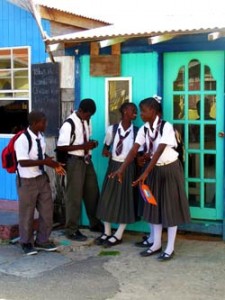 Education is mandatory in Grenada for children between 5 and 16 years old. Ninety-six percent of the population is literate. Primary school is free and well attended, and there is good access to secondary schools. School lunch programs are also common. Another program helps children from impoverished neighborhoods to receive textbooks.
Education is mandatory in Grenada for children between 5 and 16 years old. Ninety-six percent of the population is literate. Primary school is free and well attended, and there is good access to secondary schools. School lunch programs are also common. Another program helps children from impoverished neighborhoods to receive textbooks.
Despite all of this 21 percent of enrolled children drop out of school before reaching junior high, and 1 in 6 children do not enroll in secondary school. The absentee and dropout rates are high, especially among boys. In addition, preschool programs lack adequate staff and resources. Academic programs are often considered to be old-fashioned.
Grenada law prohibits and punishes the child slave trade, and has signed the United Nations Convention against Transnational Organized Crime.
It is illegal for children under the age of 14 to work, but regulations are inconsistent between the ages of 14 and 18. 15-year-old children can thus obtain working permits from appropriate ministries. Uncommon monitoring also makes it difficult to determine if children are working in spite of the restrictions.
In Grenada, physical violence (corporal punishment) and sexual violence are the two primary causes for concern.
Physical punishment is not prohibited in any realm, whether it is family, academic, or judicial. Unfortunately, violence against women is fairly widespread and is rarely officially reported, which also negatively affects children. Abuse and mistreatment are not normally punished or recognized.
Sexual violence is a recurring problem in Grenada. Although girls have protection under the law against molesting and trafficking for economic exploitation or prostitution, boys are not included in these laws, and the legal minimum age of sexual consent does not apply to them.
More than one third of Grenadan children suffered sexual violence. This is compounded by the fact that incest is a widespread, stigmatized problem that is not often reported.
UNICEF has also expressed concern about the proliferation of fixed-rate sexual relations with minors and the phenomenon of “sugar daddies,” adult men who consider themselves a child’s “protector.”
Grenada does not have an army, and there are no armed conflicts or guerillas in which to enlist child soldiers. The legal age to join the police is 19 years old.
Grenada has a system to place orphans and children with domestic problems with other families, but a lack of funds makes it mostly ineffective.
Despite governmental efforts, it is still difficult for handicapped children to access education because schools are not handicap-accessible and teachers lack the necessary special training.
Children are not always registered when they are born, and may not receive a name until they are baptized, sometimes 3 to 4 months after birth. Birth certificates do not systematically record the father’s name.
Minors in the Justice System
Many laws have been drafted to protect the rights of children, but few have been officially adopted. For example, no law exists regarding adoptions or domestic violence. In addition, there are very few funds for the legal protection of minors, and the bulk of the burden tends to fall on NGOs to identify and denounce the violation of children’s rights.
A child’s right to appear before a tribunal is not always respected, especially not for children under the age of 14 years old. The age of legal responsibility in Grenada is very low: children can be tried and sentenced as young as seven years old.
Generally speaking, children younger than 16 do not get placed in prison, but children between 16 and 18 years are imprisoned indiscriminately with adults, leaving them vulnerable to physical and sexual violence from adult detainees.
Effects of Climate Change
Grenada is very vulnerable to natural disasters, usually storms and hurricanes.


